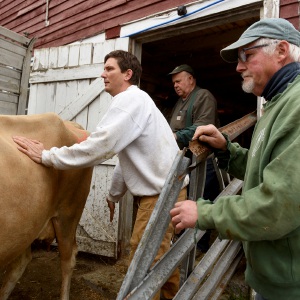Plans for Mechanic Street shelter in Lebanon taking shape
| Published: 09-12-2023 5:18 PM |
LEBANON — Over 40 city residents attended a community meeting on Monday to voice their questions, concerns or support for a proposed seasonal emergency shelter for unhoused individuals. Opponents who raised objections focused on public safety and property values, while supporters emphasized the dire need for such a facility in the city.
City administrators are proposing to convert a city-owned building on Mechanic Street into a seasonal overnight shelter that will serve up to 15 people from December through March. The city plans to contract Upper Valley Haven in White River Junction to operate the facility.
Michael Redmond, executive director of the Haven, said the shelter would be open daily from 4 p.m. to 8 a.m.. and would be staffed with two employees per shift, plus an intake coordinator and volunteers, who would assist in meal preparation and engage socially with the clients.
“Playing a game of cards or talking with people, it’s the human connection that makes our program different from perhaps what your image is of a shelter,” Redmond explained about the role of volunteers at the Haven’s shelter program.
Lebanon’s lack of a shelter is both a public safety concern and a financial burden for taxpayers, according to city administrators. New Hampshire RSA 165 requires each municipality to provide shelter or temporary housing to people seeking that assistance, City Manager Shaun Mulholland said.
Lebanon Human Services Director Lynne Goodwin said she had to ask the City Council for an additional appropriation of $70,000 in August after exhausting her entire year’s budget for housing assistance — about $105,000 — by the end of June, halfway through the fiscal year. This budget funds the costs to house people in motels or other area shelters, or to provide financial assistance with rents or mortgages.
Goodwin also appropriated $60,000 in additional department funding this year to her housing assistance budget, bringing this year’s actual budget to $230,000 – about $145,000 higher than two years ago.
The city often has to place individuals or families in motel rooms because the area’s two closest shelters — the Haven in White River Junction and the Sullivan County shelter in Claremont — do not have an available space.
Article continues after...
Yesterday's Most Read Articles
 At Dartmouth, hundreds protest ongoing war in Gaza and express support for academic freedom
At Dartmouth, hundreds protest ongoing war in Gaza and express support for academic freedom
 Herd departs Hartford’s last remaining dairy farm
Herd departs Hartford’s last remaining dairy farm
 Lebanon moves forward with plans for employee housing
Lebanon moves forward with plans for employee housing
 Colby-Sawyer president announces plan to depart
Colby-Sawyer president announces plan to depart
 Windsor man who failed to show up for trial arrested in Hartland
Windsor man who failed to show up for trial arrested in Hartland
Goodwin said the city spent $65,000 during January and February to place about 14 people in 10 motel rooms.
“We want to think more creatively about how else we can provide shelter that’s more sustainable,” Goodwin said.
The city recently purchased the proposed site — a one level commercial building on a quarter-acre parcel of land at 160 Mechanic St. — for $400,000 .
Importantly, the city intends to eventually raze the property to allow for the construction of a roundabout at the intersection of Mechanic Street and Slayton Hill Road. This project, which will be partially funded by the state, is tentatively scheduled to begin construction in 2029.
In the meantime, many meeting participants expressed support for using the property for the shelter.
Diane Garcia, 51, recently spent two years without a permanent home after vacating her previous residence due to concerns about her safety and wellbeing. She was initially placed in a motel, where she lived for six months before moving to the Haven, where she lived for 18 months.
With the help of service coordinators at the Haven, Garcia secured an apartment in Rogers House, a senior housing complex located downtown, next to City Hall and owned by the Lebanon Housing Authority.
“I think many people who are concerned (about having a shelter) don’t understand the problems of each homeless person and what they have to go through, especially if they have mental health issues, or can’t afford their medicine,” Garcia said in an interview. “That can create a crisis in itself and it may cause people to hurt themselves.”
Many people have become unhoused because they could no longer afford their rent or their living costs, especially in the current housing market where “landlords keep upping the rent,” Garcia added.
“Most people who are homeless are under terrible circumstances,” Garcia said. “It’s not just drugs or people who want to be out there.”
Resident Jeremy Ouellette, who lives on Slayton Road, said he fully supports the project but wondered why it couldn’t be a year-round shelter, given the need for housing continues during the warmer months.
A major reason against a year-round operation would be the operating cost, which would be too much of a burden on the city taxpayers, Mulholland explained.
State regulations require a year-round residential facility to have an approved fire suppression system, which the building currently lacks, according to Mulholland. The state fire marshal’s office granted the city a four-month waiver to run a shelter, provided the facility has at least two employees to serve as fire watch.
Mulholland noted that the city will need to reapply for this waiver annually and there is no guarantee that the state will grant it in future years.
Some residents also raised concerns and reservations about the shelter.
Joe and Deb Paduda own a multi-family residential building with five apartment units on Slayton Hill Road, directly across the street from the proposed site. The Padudas said they worry the shelter will attract criminal behavior and cause property values in the surrounding area to drop.
“We have dealt with Lebanon police trying to get people to stop doing things that endanger our tenants and they say they don’t have the manpower to deal with it,” Joe Paduda said. “So now you’re going to put in a homeless shelter where the data clearly indicates that crime is going to increase.”
Paruda cited a study published by the Rand corporation, a nonprofit research center, which found an 56% increase in crime – primarily acts of vandalism and theft – in areas where shelters are located.
City Councilors George Sykes and Doug Whittlesey explained their support for the project, saying that saving lives needs to be a city priority.
“To me, this is a crisis,” Whittlesey said. “We are coming up on winter and we are pushing that boundary of what we can do even before we get there. … If we can keep those 12 (or 15) people alive, I will consider that a wild success.”
The city is still finalizing the project budget, though Mulholland and Goodwin estimated it will cost around $200,000 per year to operate and maintain the facility, and as much as $150,000 for construction. The renovated facility will also include two showers, a washer and dryer, and a small kitchen for heating food.
Some costs could be offset by grants or donations, according to the administrators. The city has already received two donations for the project — $25,000 from Dartmouth Health and $50,000 from the Jack and Dorothy Byrne Foundation.
The city hopes to open the shelter by Dec. 15, though that date will hinge on many factors, including the completion of construction and the Haven’s ability to hire staff.
The Lebanon Planning Board will hold a public hearing on Sept. 25 at 6:30 p.m. in City Hall to hear the proposal and consider recommendations for addressing potential impacts on public safety and the surrounding community.
Patrick Adrian may be reached at padrian@vnews.com or 603-727-3216

 Sharon voters to decide $9.5 million school building bond
Sharon voters to decide $9.5 million school building bond  Dartmouth graduate student-workers go on strike
Dartmouth graduate student-workers go on strike
